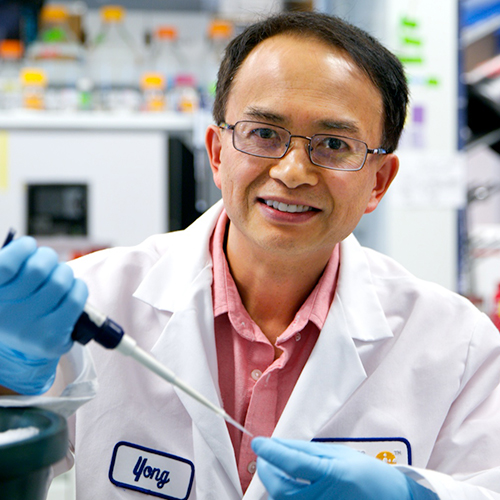This website uses cookies so that we can provide you with the best user experience possible. Cookie information is stored in your browser and performs functions such as recognising you when you return to our website and helping our team to understand which sections of the website you find most interesting and useful.
Yong Chi
at the Institute for Systems Biology
Yong Chi
Research Scientist
 moritz.isbscience.org/bio/yong-chi/
moritz.isbscience.org/bio/yong-chi/
Dr. Chi joined the ISB as a postdoctoral fellow in Dr. Ruedi Aebersold’s lab in 2002 and then Dr. Bruce Clurman’s lab in Fred Hutchinson Cancer Research Center in 2005. He has remained as a visiting scientist in Dr. Moritz’s lab since 2008. Dr. Chi’s main research interest is how protein kinases regulate important cellular processes, such as the cell cycle, through phosphorylation of their specific targets. To expedite the discovery of kinase and substrate networks, he has developed robust methodologies to systematically identify protein kinase substrates using chemical genetics, protein chemistry, and mass spectrometry-based proteomics. Dr. Chi applied his methods to study the human cyclin-dependent kinase 2 (CDK2), a master regulator of the cell cycle transition, and discovered a large number of new targets that CDK2 potentially regulates. Using human cell line models and cell biology techniques in the Clurman lab, he is now validating several chromatin-binding proteins as a new class of CDK2 substrates. Dr. Clurman and Dr. Chi were awarded an R21 grant in 2015 to identify novel substrates of the cyclin D-CDK4/6 kinase, which is currently one of the major kinase drug targets in cancer therapy.
Proteomics
Biochemistry
Cell Biology
B.A. Molecular and Cell Biology
University of California at Berkeley
Ph.D. Biology
California Institute of Technology
- Hizli, A.A., Chi, Y., Swanger, J., Carter, J.H., Liao, Y., Welcker, M., Ryazanov, A.G., Clurman, B.E. Phosphorylation of eukaryotic elongation factor 2 (eEF2) by cyclin A-cyclin-dependent kinase 2 regulates its inhibition by eEF2 kinase. Mol. Cell Biol. 2013; 33:596-604. (dx.doi.org/10.1128/MCB.01270-12)
- Serres, M.P., Kossatz, U., Chi, Y., Roberts, J.M., Malek, N.P., Besson, A. p27Kip1 controls cytokinesis via the regulation of citron-kinase activation. J. Clin. Invest., 2012; 122:844-58. (dx.doi.org/10.1172/JCI60376)
- Chi, Y. and Clurman, B.E. Mass spectrometry-based identification of protein kinase substrates utilizing engineered kinases and thiophosphate labeling. Curr. Protoc. Chem. Biol., 2010; 2:219-234. (dx.doi.org/10.1002/9780470559277.ch100151)
- Chi, Y., Welcker, M., Hizli, A.A., Posakony, J.J., Aebersold, R., and Clurman B.E. Identification of CDK2 substrates in human cell lysates. Genome Biol., 2008; 9(10):R149. (dx.doi.org/10.1186/gb-2008-9-10-r149)
- Chen, X., Barton, L.F., Chi, Y., Clurman B.E., and Roberts, J.M. Ubiquitin-independent degradation of cell cycle inhibitors by the Reg- proteasome. Mol. Cell, 2007; 26:843-852. (dx.doi.org/10.1016/j.molcel.2007.05.022)
- Lipford, J.R., Smith, G.T., Chi, Y., and Deshaies, R.J. A putative stimulatory role for activator turnover in gene expression. Nature, 2005; 438:113-116. (dx.doi.org/10.1038/nature04098)
- Chen, X., Chi, Y., Bloecher, A., Aebersold, R., Clurman, B.E., and Roberts, J.M. N-acetylation and ubiquitin-independent proteasomal degradation of p21Cip1. Mol. Cell, 2004; 16:839-847. (dx.doi.org/10.1016/j.molcel.2004.11.011)
- Chi, Y., Huddleston, M.J., Zhang, X., Young, R.A., Annan, R.S., Carr S.A., and Deshaies, R.J. Negative regulation of Gcn4 and Msn2 transcription factors by Srb10 cyclin-dependent kinase. Genes & Dev., 2001; 15:1078-1092. (dx.doi.org/10.1101/gad.867501)
- Blondel, M., Galan, J., Chi, Y., Lafourcade, C., Longaretti, C., Deshaies R.J., and Peter, M. Nuclear-specific degradation of Far1 is controlled by the localization of the F-box protein Cdc4. EMBO J., 2000; 19:6085-6097. (dx.doi.org/10.1093/emboj/19.22.6085)
- Elsasser, S., Chi, Y., Yang, P., and Campbell, J.L. Phosphorylation controls timing of Cdc6p destruction: A biochemical analysis. Mol. Biol. Cell, 1999; 10:3263-3277.
- Seol, J.H., Feldman, R.M., Zachariae, W., Shevchenko, A., Correll, C.C., Lyapina, S., Chi, Y., Galova, M., Claypool, J., Sandmeyer, S., Nasmyth, K., and Deshaies, R.J. Cdc53/cullin and the essential Hrt1 RING-H2 subunit of SCF define a ubiquitin ligase module that activates the E2 enzyme Cdc34. Genes & Dev., 1999; 13:1614-1626.
- Henchoz, S., Chi, Y., Catarin, B., Herskowitz, I., Deshaies, R.J., and Peter, M. Phosphorylation- and ubiquitin-dependent degradation of the cyclin-dependent kinase inhibitor Far1p in budding yeast. Genes & Dev., 1997; 11:3046-3060.


